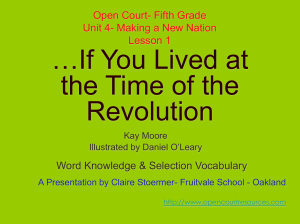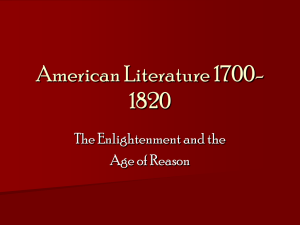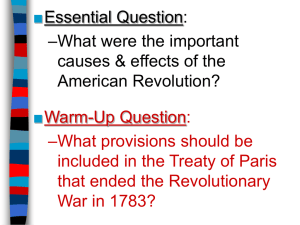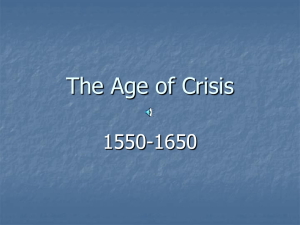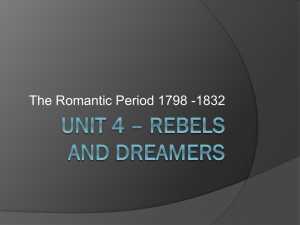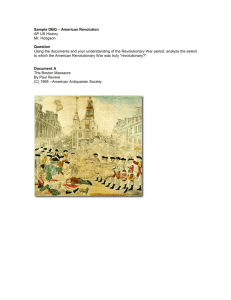A Revolution to Conserve
advertisement
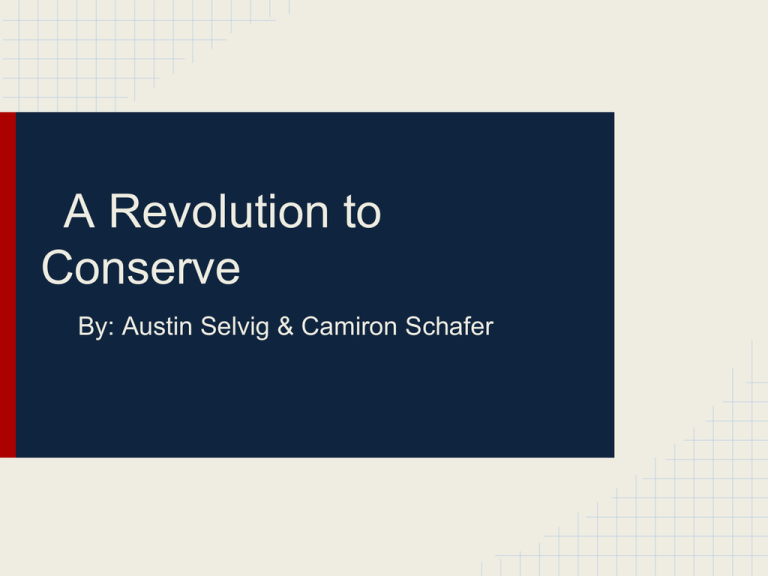
A Revolution to Conserve By: Austin Selvig & Camiron Schafer Concepts - Plainly laid out factors that lead to the Revolution - a series of factors led to the American Revolution - The frontier environment- The frontier environment made many English institutions irrelevant to the needs of colonists and were adapted to suit their needs, a large example is the adaptation of self-government - Conflicting interests- The English looked to their colonies as an economical advantage; the colonies, however, saw imperial policy as stifling of their own self government Concepts (cont.) - Geography- The distance alone diluted English policy and execution as well as colonial protest - Immigration- an increasing percent of population that was not loyal to the British Crown, immigration increased diversity and an influx of ideals and opinions, further creating a need for more democracy - Natural rights- the colonists believed that being English citizens granted them rights which they believe to be jeopardized by the English Government Importance The main question answered in the text, what factors causes the desire to rebel, is very important as it discusses how many of the factors that caused the revolution shaped the mindset of the American people The analysis of these factors is important because they have a direct correlation to the American Revolution and the mindset of the colonists at that period of history Format - Rossiter did not write chronologically, instead he organized his writing by each factor of his main concept. -Rossiter introduces the Revolution and discusses the feud between George III and the colonists. He then asks the question of what led to the desire to rebel. He follows up by providing responses to this question from John Adams, Edmund Burke, and Alex de Tocqueville, then, he supports these three and provides his own responses to the question. He concludes his writing by recapping his main points. - The format of the text works very well as it allows emphasis on each topic individually Attention Grabbers ● Interesting quotes: ○ About Rossiter’s support of Adams, Burke, and Tocqueville: “My purpose… is to provide an extended commentary in support of Adams, Burke, and Tocqueville, not that this glorious threesome needs support from anyone. I accept with practically no reservations the notion that the American Revolution was wholly different in character and purpose from the French, Russian, and almost all other revolutions, and I ascribe this difference largely to the plain truth that the Americans had no need and thus no intention to “make the world over.”” ○ Burke’s description of the sharp conflict between colonist and Britain: “The temper and character which prevail in our colonies are, I am afraid, unalterable by any human act. We cannot, I fear, falsify the pedigree of this fierce people, and persuade them that they are not sprung from a nation in whose veins the blood of freedom circulates. The language in which you tell them this tale would detect the imposition; your speech would betray you…” Attention Grabbers(continued) ● England felt the only people who needed to emigrate were convicts and the poor. ○ ~30,000-40,000 convicts were shipped to the colonies from England during the 18th century. ● America was a melting pot. ○ English: 65-70% ○ Scots and Scotch Irish: 12-15% ○ Germans: 6-9% ○ Irish: 3-5% ○ Dutch: 3% ○ Other: 3-5% ○ Out of total population of 1,850,000 about 400,000 were Negroes and mulattoes. ● The more trouble America got into, the more appeal it had to outsiders. ○ Population increase from 1,850,000 to 2,500,000 in 1775. Evaluation of the Author Background Graduated from Cornell in 1939 and earned his Ph.D from Princeton University Was a member of the U.S. Navy Reserve and rose to the rank of lieutenant as a gunnery officer on the USS Alabama, served three years Credentials taught at Cornell University from 1947 to 1970; he rose from instructor to full professor in eight years Served as chair of the Government Department in Cornell from 1956 to 1969 Pitt Professor of American History and institutions from 1960 to 1961 Biases Biases in the Text The text leaves very little room for bias within the main points as it is written in an objective style that merely states factors and their influence, that being said, Rossiter does display a bias towards emphasising the struggles of colonists and the tyranny of the English Conclusion ● Influence on my opinion: Find the topic of the American Revolution more interesting. Learned that it was more than just a big war that ended with the signing of the Declaration of Independence. ● Would I recommend it as scholarship? Yes, better than your stereotypical textbook. From a human’s standpoint, yet with a lot of evidence to support topics and to provide more in depth information and background so the reader is able to understand the topics Rossiter discusses.


